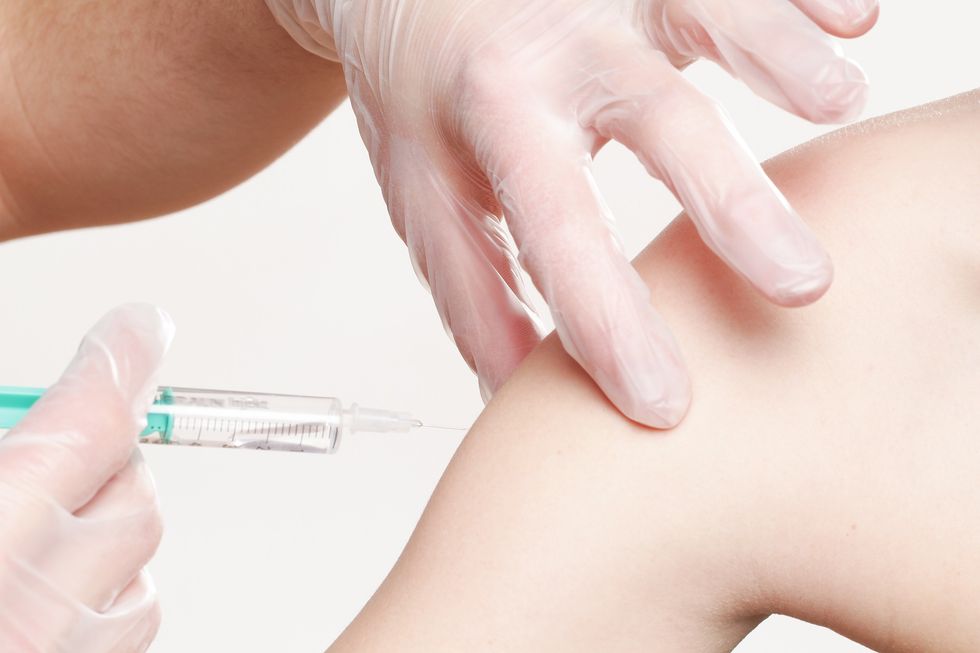As this year's flu wreaks havoc across the nation, it's the flu vaccine that's taking the blame. This handy little shot has gotten a bad rap even from vaxers who claim that the flu shot is merely a guess at best, and at worst claim that it can actually give you the flu. However, the flu shot is truly a boon this time of year that suffers from some bad misconceptions and even user error. Here are five common misconceptions debunked.
1. "The flu vaccination is effective when received during flu season."
Too often, people don't get their flu vaccine until the flu has already begun to spread, make headlines on the news, and people they know have it. However, the flu vaccine can take several weeks to be fully effective. If you wait until the flu is already going around to receive your vaccination, it's already too late. The vaccine won't be effective in nearly enough time to offer you any immunity. Often, people wind up getting the flu due to exposure before the vaccine is effective, and then, having just gotten the shot, blame the vaccine and think that the vaccine gave them the flu. The time to get your flu vaccination is early fall, before anyone but medical professionals are thinking of flu season and with ample time to prepare your immune system for when the flu does hit.
2. "You have to get a shot to receive the flu vaccine."
One of the primary reasons why people forgo the flu vaccine is a simple fear of needles. For a vaccine that is not considered mandatory, many wish to risk the flu in exchange for not being stuck with a needle. While injections are still the most popular way to receive the flu vaccine, there is another pain-free option: the nasal spray flu vaccine. You simply inhale the vaccination with no breaking of the skin and you're done.
3. "The flu vaccine causes the flu."
Whether it be because someone waited too long to get the flu vaccination and then got sick after getting the shot, or because the flu vaccine contains the flu virus within it, there are plenty who believe that the flu shot can give you the flu. This is far from true. There are two forms of the flu vaccination: an injection, and a nasal vaccination that is inhaled, with the injection being the most popular form by far. The flu virus in the injection is completely inactivated, or "dead," (however, since viruses are not composed of cells and therefore not alive, they technically can be neither alive nor dead). These cannot cause the flu at all. The viruses in the nasal spray, while active, are severely weakened so that they cannot cause an infection and cannot survive in the body as it is too warm for these viruses.
4. "A poor match offers no protection."
Perhaps the most infamous reason for avoiding flu shots is that "the vaccination is just a guess at which strains of the flu will be going around, so it's not worth getting when it won't offer protection if the guess is wrong. The flu vaccine is more than a random guess. Researchers pour time and money in to track all of the strains going around the world for what usually amounts to be a fairly accurate prediction. But, what's even more important is that the vaccination, even if a poor match to the strains going around, can still offer your immune system an extra edge. Even people vaccinated with less effective vaccines have a significantly lower rate of infection than their unvaccinated counterparts.
5. "The flu is not that bad."
"The flu isn't that bad. It's not worth getting a vaccine for. People get it all the time." Sound familiar? It's a common phrase each winter. There's a common saying that says it only takes getting the flu once to make someone get their vaccination every year for the rest of their lives. It's no illness to take lightly. The flu is one of the worst common illnesses around and can be deadly for some, namely infants, the elderly, and immune-compromised people, such as some cancer patients. Even if you don't fit into one of these three groups, the threat of the flu is serious and real for them and could quite literally be a life or death matter. The more people that receive the vaccine, the more protection they have, and the more protection healthy, young individuals have, too.



 mr and mrs potato head
StableDiffusion
mr and mrs potato head
StableDiffusion







